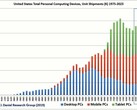While smartphones have evolved quite a bit as far as performance goes in recent years, they cannot yet completely replace PCs. The mobile processors have been locked to eight cores for a few years now, and the iGPUs are fairly limited when it comes to onboard VRAM, plus there is no ray tracing support on any mobile iGPU as of now. It is clear that the PCs are here to stay, at least for the next decade, and the latest market reports even show that PC shipments recorded in 2019 were up for the first time since 2011. Surprisingly enough, this uptick was caused by the Windows OS.
Research firms Gartner and IDC conducted separate investigations with different results, but they each describe an actual growth in the PC sector. IDC calculated that the year-over-year figures for PC shipments increased by 2.7%, whereas IDC measured only a 0.6% uptick. This discrepancy appears to be caused by the methodology used by each firm. For instance, IDC considers Chromebooks as PCs, but tablets are out of the question, while Gartner includes Microsoft’s Surface tablets in the PC spectrum, yet excludes Chromebooks.
What has Windows OS got to do with this growth? Microsoft announced last year that it will end support for Windows 7 systems in 2020, so most businesses rushed to replace their old computers with Windows 10 ones. This trend is expected to continue throughout the next few quarters. The reports estimate that 261 to 267 million new PCs were shipped over the course of 2019 worldwide. Still, these figures pale when compared to smartphone shipments. In Q3 2019 alone, 358 million handhelds were shipped worldwide.
The reports agree that the the leading PC OEMs remain Lenovo, HP and Dell, while Asus and Acer recorded declining shipments, most likely because of Intel’s CPU shortages. Apple also saw declining computer shipments, but these setbacks were compensated with increased iPhone shipments.
Loading Comments
I first stepped into the wondrous IT&C world when I was around seven years old. I was instantly fascinated by computerized graphics, whether they were from games or 3D applications like 3D Max. I'm also an avid reader of science fiction, an astrophysics aficionado, and a crypto geek. I started writing PC-related articles for Softpedia and a few blogs back in 2006. I joined the Notebookcheck team in the summer of 2017 and am currently a senior tech writer mostly covering processor, GPU, and laptop news.
> Expert Reviews and News on Laptops, Smartphones and Tech Innovations > News > News Archive > Newsarchive 2020 01 > 2019 PC shipments were surprisingly up for the first time in 7 years
Bogdan Solca, 2020-01-16 (Update: 2020-01-16)










